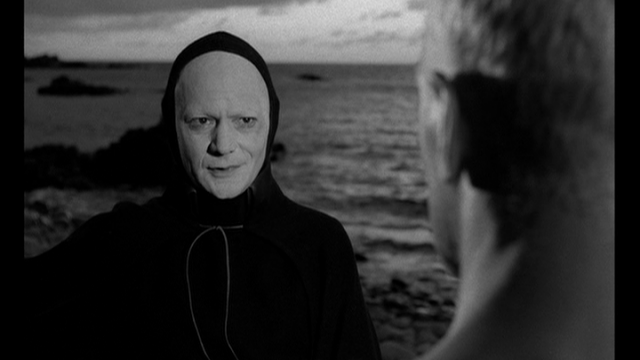The Seventh Seal is practically a synecdoche of art house cinema: a subtitled, black & white foreign import that features heavy soliloquies and dialogues on Important topics. It’s a film whose reputation precedes it so thoroughly that you don’t actually have to see it to know that it’s a dire meditation on death, the cruelty of man, and the struggle to believe in a God who could let such terrible things happen every day. That’s not even mentioning the iconic image of a man playing chess against Death himself, a scene which has been parodied everywhere from Animaniacs to Bill and Ted’s Bogus Journey to The Colbert Report.
Yet most reviews and discussions of the film leave out one crucial bit of information: it can be absolutely hilarious.
When I first saw the film at a screening in the FSU Student Life Cinema, I was shocked that it had a sense of humor. I had been under the assumption that foreign art house film was Super Serious and strictly cinematic vegetables. And yet here it was: somber meditations on the meaning of life nesting comfortably next to some pretty bawdy sex jokes. (For instance: there’s a scene where a traveling theater troupe’s director has a sensual picnic with a blacksmith’s wife while the actors perform a song heavily reliant on braying like barnyard animals. It probably wouldn’t feel out of place in a Farrelly Brother film*.)
*On a similar note: there’s a scene where Jöns does a play-by-play commentary for those same actors, predicting every move the blacksmith’s cheating wife will make to manipulate her husband into taking her back. It’s hard not to imagine the Coen Brothers being influenced by this when writing the lunch counter scene in The Hudsucker Proxy.
In fact, that humor is essential for Bergman to make his more serious points. The film is anchored by Antonious Block, a soldier returning from the Crusades with his faith in man and God severely shaken. Block is a serious man, an idealist asking serious questions to try and make sense of the senseless carnage of war, and he’s just about the only serious character in the film. Most of the other characters with speaking roles are cynical and witty, the kind of people you’d find bouncing around in a Hollywood screwball comedy. There’s the lecherous theater troupe director I mentioned before; the husband and wife acting team who are, respectively, a wide-eyed dreamer and a realist; Antonious Block’s companion, Jöns, a veteran whose tough-as-nails exterior hides a compassionate heart; and Death himself.
Death may dress somberly and speak in measured tones, but he’s a wry, mischievous personification of a concept. In fact, you might even say he’s kind of a dick. Death teases Antonious Block every time he asks questions about God or the meaning of life, tricks him into revealing his chess strategy, and in general won’t shut up about how he’s inevitably going to win the game and take Block and everyone he cares about. Death isn’t a cold and detached professional just doing his job, he’s clearly enjoying himself.
Because ultimately the world of The Seventh Seal is as inhospitable and cruel as Death himself, and now matter how you live it all ends the same way. Yet for Bergman this doesn’t mean we should despair, doesn’t mean we should beat ourselves up trying to appease God or try to fleece our fellow man because won’t be any meaningful consequences. For Bergman that inhospitable and cruel world can only be conquered through humanity and compassion, and there’s no better combination of the two than making someone laugh.

